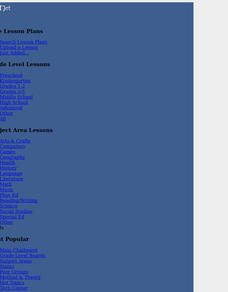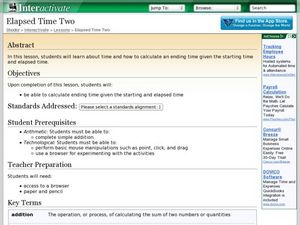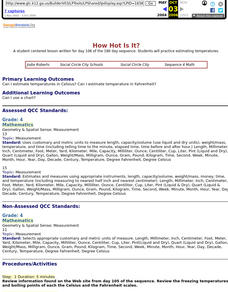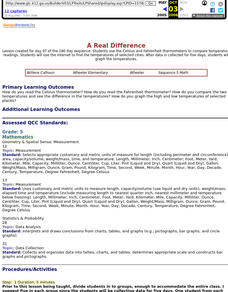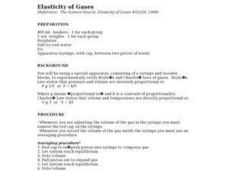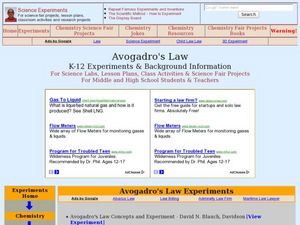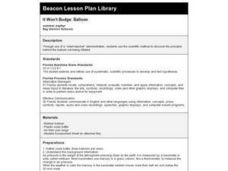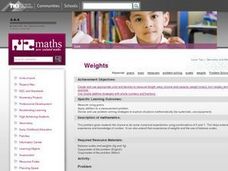Curated OER
Paper Planes
In this unit, 3rd graders investigate one variable to see if they can make a paper plane fly farther. They use scatter plots to establish a possible relationship between variables then use what they have found to make a paper plane to...
Curated OER
Parachutes: What Affects a Parachute
Students create a simple paper parachute. In this parachute design lesson, students examine the effects of the wind and make napkin parachutes.
Curated OER
Saltwater Science
Students conduct an experiment that shows them how salt water allows things to float. In this salt water lesson plan, students mix ingredients together to create salt water and observe how it makes the oceans dense. They then interpret...
Curated OER
Lesson Exchange: Polygons (Middle, Mathematics)
Pupils discover the relationship between the sides of a polygon and the number of diagonals that can be drawn from one vertex, the number of triangles that those diagonals form, and the sum of the interior angles of that polygon.
Curated OER
Reading Trees: Understanding Dendrochronology
Students examine tree-ring dating and discuss the lack of water the settlers in Jamestown faced. They create paper tree rings, simulate rain patterns, and describe the history of construction paper tree sequences.
Curated OER
Clockwise
Second graders investigate angles through this series of lessons. They determine how angles turn in both clockwise and anticlockwise directions. They examine the characteristics of quarter half turns and how they can begin from any...
Curated OER
Trains
Pupils compare the lengths of the train through calculation. This calculation can be done by knowing the values of the rods. Students use problem solving to get the answer to the problem before them.
Curated OER
What's The Matter?
Fourth graders accurately describe various states of matter, Through experimentation, they change a variable to create a new state of matter. Students record their observations about the way matter is changed and the changes that occur...
Curated OER
Elapsed Time Two
Learners study how to calculate elapsed time. For this elapsed time lesson, they determine how to calculate the ending time of an event when they are given the starting time and the elapsed time. They participate in direct instruction,...
Curated OER
Matter & Subatomic Particles
Seventh graders divide into small groups to construct several models. Each group builds with an accompanying chart showing the colors of gumdrops used for the protons, electrons, and neutrons.)
Curated OER
Impact of Exotic Species on Lake Ecology
Students examine the effect of foreign species on various habitats. In groups, they identify the population dynamics of the zebra mussel. They calculate averages and graph data from Seneca Lake in New York. They develop hypothesis...
Curated OER
Get Down With Density
Students define density and observe that things that are less dense than water will float. Students find the density of copper, iron and aluminum
Curated OER
How Hot Is It?
Fourth graders practice estimating temperatures. They practice in Celsius and Fahrenheit.
Curated OER
A Real Difference
Fifth graders use the Celsius and Fahrenheit thermometers to compare temperature readings. They use the Internet to find the temperatures of selected cities. After data is collected for five days, 5th graders graph the temperatures.
Curated OER
Elasticity of Gases
Students investigate gas laws and apply them in experimental conditions. Using an apparatus composed of a syringe and wooden blocks, they experimentally verify Boyle's and Charles' laws of gases.
Curated OER
Avogadro's Law
Students study Avogadro's law and what it means in science. In this gaseous lesson students complete an Avogadro's law experiment.
Curated OER
Air Expansion and Contraction
Pupils observe that air exerts pressure, that heated air expands and that cooled air contracts. After the demonstration, students engage in a question and answer session about what they saw.
Curated OER
It Won't Budge: Balloon
Eighth graders use the scientific method to discover why a balloon is not inflated.
Curated OER
The Same But Different
Fourth graders identify the characteristics of a simple physical change. They describe objects by the properties of the materials from which they are made. Students discuss the different states of matter and their distinct physical...
Curated OER
Using Multiplication to Solve Word Problems
Young scholars explore math functions by solving word problems in class. For this multiplication lesson, students utilize colored cubes and base blocks to visualize multiplication problems. Young scholars identify the multiplication...
Curated OER
How much room?
Students examine the amount of usable space that exists in their classroom using square meters and square centimeters. They apply the information to predict the ideal size of a classroom.
Curated OER
Perimeters, Patterns, and Conjectures
Students discover patterns and write conjectures relating to perimeters and polygons. Working in cooperative learning groups, they use manipulatives and graphic organizers to solve problems then answer a series of questions in which they...
Curated OER
WHY DO SOME THINGS FLOAT WHILE OTHERS SINK
Students explore how density can cause things to sink or float by experimenting with a jar, oil and corn syrup.
Curated OER
Weights
Students find an object that they estimate weighs 20g and check estimates on the balance scales. They read the problem and work in pairs focusing their understanding on the size of grams.



